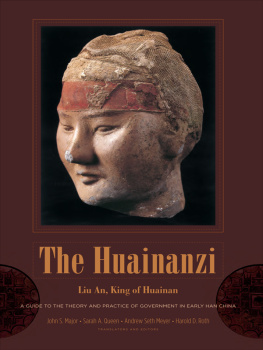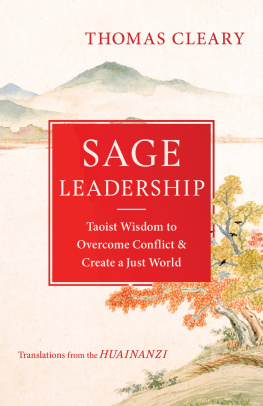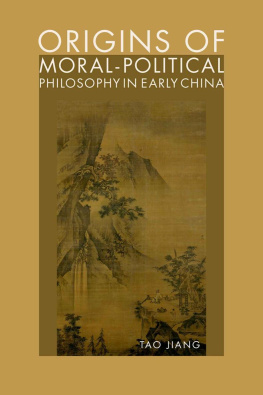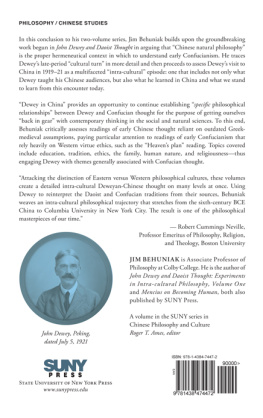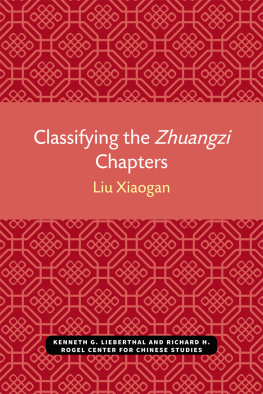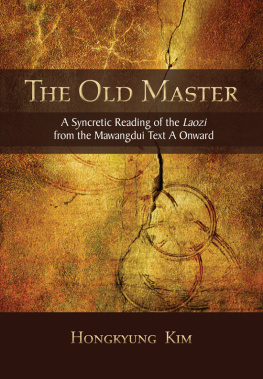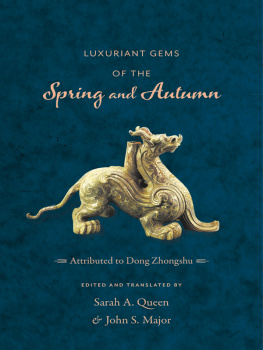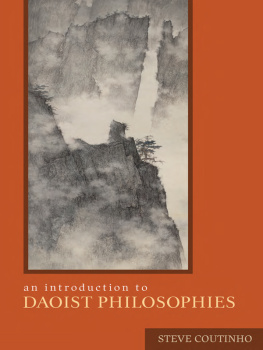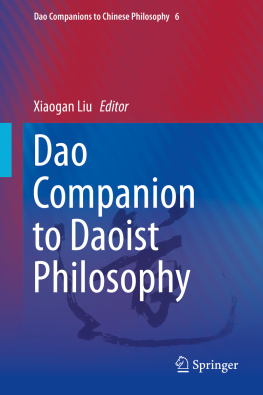The Huainanzi
TRANSLATIONS FROM THE ASIAN CLASSICS
TRANSLATIONS FROM THE ASIAN CLASSICS
Editorial Board
.............................................................
Wm. Theodore de Bary, Chair
Paul Anderer
Irene Bloom
Donald Keene
George A. Saliba
Haruo Shirane
Wei Shang
Burton Watson
The Huainanzi
A GUIDE TO THE THEORY AND PRACTICE OF GOVERNMENT IN EARLY HAN CHINA
Liu An, King of Huainan
Translated and edited by
John S. Major, Sarah A. Queen, Andrew Seth Meyer, and Harold D. Roth, with additional contributions by Michael Puett and Judson Murray
COLUMBIA UNIVERSITY PRESS
NEW YORK


Columbia University Press
Publishers Since 1893
New York Chichester, West Sussex
cup.columbia.edu
Copyright 2010 Columbia University Press
All rights reserved
E-ISBN 978-0-231-52085-0
Library of Congress Cataloging-in-Publication Data
Huainan zi. English
The Huainanzi : a guide to the theory and practice of government in early Han China / Liu An, King of Huainan [... [et al.]] ; translated and edited by John S. Major... [et al.], with additional contributions by Michael Puett and Judson Murray.
p. cm. (Translations from the Asian classics)
Includes bibliographical references and index.
ISBN 978-0-231-14204-5 (cloth : alk. paper)
I. Liu, An, 179122 B.C. II. Major, John S. III. Title. IV. Title: Guide to the theory and practice of government in early Han China. V. Series.
BL1900. H822E5 2010
181'.114dc22
2009019565
A Columbia University Press E-book.
CUP would be pleased to hear about your reading experience with this e-book at .
References to Internet Web sites (URLs) were accurate at the time of writing. Neither the author nor Columbia University Press is responsible for URLs that may have expired or changed since the manuscript was prepared.
For our children

W E OWE a particular debt of gratitude to three colleagues who participated actively in this translation project. Michael Puett and Judson Murray served as cotranslators of chapters , respectively, and they also participated in many of our team meetings and online conversations and made many valuable contributions. Jay Saileys active and enthusiastic participation in the early stages of our work helped get the project off to a good start, and his continuing interest in our work provided welcome moral support.
William Boltzs work of determining the ending rhymes for sentences enabled us to proceed with our method of formatting the translations so as to preserve such distinctive features as parallel prose and verse. Jung-Ping Yuan and Bo Lawergren provided much-appreciated advice about ancient Chinese stringed instruments. Similarly, we thank Scott Cook and Dan Lusthaus for lending us their expertise on musical matters. We thank Martin Kern of Princeton University for sharing with us his penetrating insights into the structure and rhetoric of . We are grateful also to Charles Le Blanc, Rmi Mathieu, and their co-workers on the complete French translation of the Huainanzi for their collegiality and goodwill. Our work has also benefited enormously from the textual labors of several modern scholars; we would like to express our gratitude to Zhang Shuangdi, Chen Yiping, and He Ning for their critical editions; to Kusuyama Haruki for his critical edition and Japanese translation; and to D. C. Lau and his associates in the ICS Ancient Chinese Text Concordance Series project at the Chinese University of Hong Kong for the splendid concordance edition that we have used as the basic text for our translation.
Anne Holmes prepared this books index with her customary effortless-seeming expertise. Sara Hodges did similarly excellent work on the books maps. Matthew Duperon at Brown University did yeomans work on the books bibliographical appendix, as well as helping check the notes and other tasks in the final stages of manuscript preparation. Gail Tetreault, Kathleen Pappas, and Melina Packer at Brown University and Nancy Lewandowski at Connecticut College provided invaluable staff support for the project, for which we are very grateful.
We are deeply indebted to our editor at Columbia University Press, Jennifer Crewe, for her expert and supportive work on this volume. We also wish to thank the project editor, Irene Pavitt; the copy editor, Margaret B. Yamashita; and the books designer, Lisa Hamm. In addition, we want to express our appreciation for the careful reading of our manuscript by the presss peer reviewers, who made many valuable suggestions for improving our work.
We acknowledge with deep gratitude the support of the Chiang Ching-kuo Foundation for International Scholarly Exchange, which provided a two-year grant to launch this translation project. Without that initial funding, this book very likely would not exist. Some of Harold Roths later work on the project was supported by a grant from the National Endowment for the Humanities. Additional funding from the trustees of Brown University for the Richard B. Salomon Faculty Research Awards, and the Brown University Departmental Research Funds for Arts, Humanities, and Social Sciences enabled our translation team to meet at Brown several times a year for a period of more than a decade. Those meetings were the key to making this project a truly collaborative effort.
For the members of the translation team, the writing of this book involved not only difficult challenges and sustained hard labor over a period of years but also steadily strengthening feelings of collegiality, friendship, and pleasure in one anothers company. Accordingly, each of us thanks the others for making this project a rich and deeply gratifying experience.
In addition, John Major wishes to thank Professors Nathan Sivin and Ying-shih Y for first guiding his steps onto the path of Huainanzi studies, and to acknowledge with grateful memory several scholars of an older generation, including Derk Bodde, Wing-tsit Chan, H. G. Creel, Benjamin I. Schwartz, and Joseph Needham, for their kind encouragement and support. He feels a great debt of gratitude to many colleagues in the field of Early China studies, too numerous to mention individually, for their friendship and generosity over the course of a long and rewarding career. He also thanks his wife, Valerie Steele, and his brother, David C. Major, both of whom read large sections of the manuscript and made many valuable suggestions for its improvement. He is grateful as well to his son Steve Major for his understanding and enthusiasm, and to his nephew Graham Majorhart for invaluable last-minute assistance.
Sarah Queen wishes to thank her mentors who inspired, encouraged, and guided her in her initial forays into Han intellectual history: Benjamin I. Schwartz, Tu Weiming, Michael Loewe, and Nathan Sivin. She would also like to thank John Major and Harold Roth for inviting her to participate in the most gratifying project of her academic career and for all the years of guidance, expertise, and support that each has offered her as she sought to expand the depth and breadth of her expertise in Han intellectual history. In addition, she would like to thank her colleagues in the field of Early China who shared their knowledge, offered their encouragement, and gave generously of their time as she developed various interpretive arguments for this project: Paul Goldin, Martin Kern, Michael Nylan, Michael Puett, and David Schaberg. Finally, on a more personal note, Sarah Queen would like to thank her family and friends for their endless reserves of love and support. She offers a special thanks to Thomas and Benjamin for understanding their mothers seemingly insatiable penchant to get lost in early Chinese texts.

